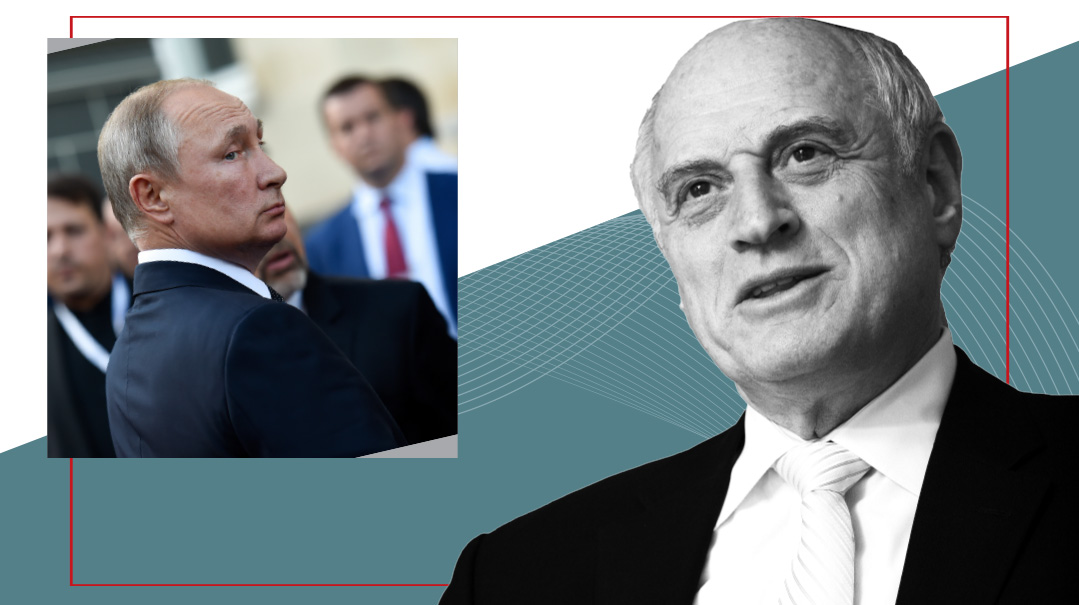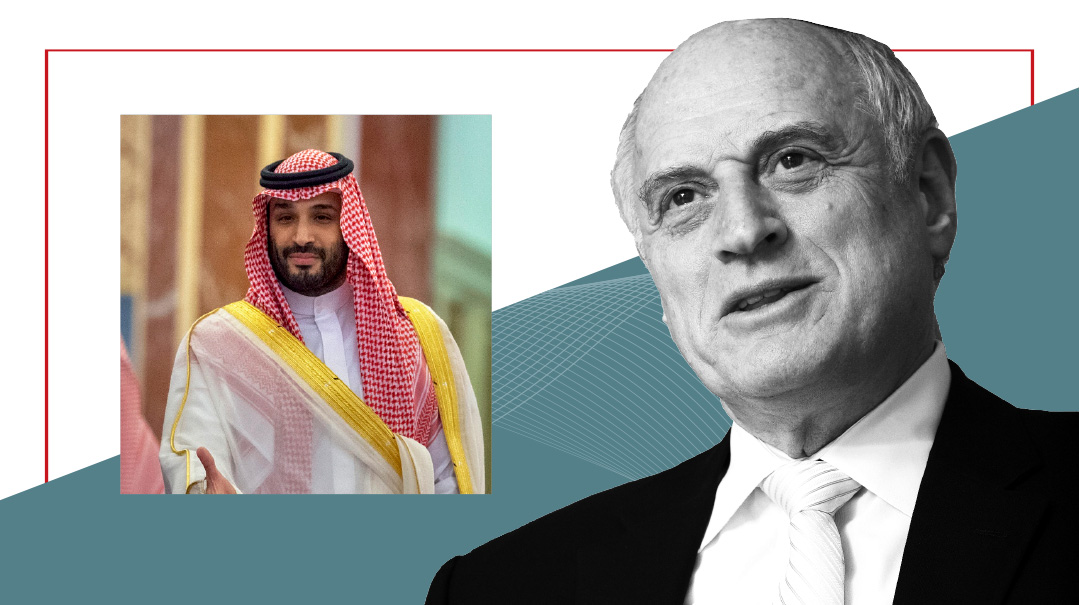Putin and the Jews
| February 14, 2023Malcolm Hoenlein's privileged take on the world's power players

A year after his invasion of Ukraine, Vladimir Putin is a pariah in the West, shunned as a warmonger who brought conflict back to the heart of Europe for the first time since
World War II.
But away from the news, world leaders are often more complex and multifaceted than you might assume; Putin is a good example of a person who isn’t simple to read or perhaps purely evil.
On the occasions I met him, I found Putin to be a shrewd and seemingly smart man, and unexpectedly receptive to hearing our perspectives.
Our first meeting was in 1998, when he was head of the KGB, and I traveled to Moscow to pressure the Russians to stop selling dual-use technology to Iran that could be valuable in their ballistic missile program.
It was a time of political turmoil in the twilight of President Boris Yeltsin’s term, and Viktor Chernomyrdin was prime minister — one of four officials to occupy the office between 1998 and 1999.
Chernomyrdin had been in charge of Russian gas giant Gazprom — a major component of the country’s economy — before becoming prime minister.
We had an intense exchange with Chernomyrdin, and in the end, he promised, almost mockingly, to provide the executive order to block the technology transfer. But afterward, the order wasn’t forthcoming.
Vice President Al Gore’s chief aide, Leon Firth, was in Moscow for the same purpose. He sent my delegation to the Ministry of Technology, where the minister was obviously briefed on the subject, and began our discussion by saying, “Here are your questions, and here are our answers.”
When he’d finished, I stated that a nuclear Iran was a threat to Russia as well as the US or Israel. Unexpectedly, a man in uniform present at the briefing jumped in with the same analysis, doubling down on our concerns.
He noted that only Russia and Israel faced challenges of terrorism both inside and outside their borders. It seemed clear he was very well-informed about global politics. We were impressed, and at that point I interjected that he had not been introduced to us.
“I’m Vladimir Putin,” he replied. “I’m the head of the KGB.”
A silent gasp went through the room as he pronounced those words. But we quickly regained our equilibrium, and continued speaking for over an hour. We engaged in some sparring, but Putin was essentially in agreement with us. When he concluded speaking, I was able to raise the dangers of a nuclear Iran to Russia, the US, and Israel, noting the presence of a large Muslim population in Russia that could be influenced and subverted by Iran, and the strategic considerations.
At the end, office staff came in bearing vodka and canapes. I rustled papers and tried to lay low, as I didn’t wish to partake, but Putin slammed a shot glass on the table in front of me and poured for me.
“You are going to drink with me!” he said sternly.
After drinking the vodka, I took a deep breath.
“General, this is very strange for me,” I said. “The last time I had any dealings with the KGB, I was arrested.”
(That’s a story for another time, but after that arrest I was banned from the USSR for the next 25 years.)
Putin asked when and where that was. I told him it was in 1971, in Moldova.
Putin grinned, and showed a flash of sharp humor. “That’s why we got rid of it,” he quipped, referring to Moldova’s declaration of independence from the former USSR in 1991.
The following morning, to everyone’s surprise, I received the executive order at my hotel in Moscow blocking the sale of the technology to Iran, and sent it on to Vice President Gore’s assistant, who was trying to secure it.
The next time I saw Putin was about a year later, at a reception at the White House. I saw his eyes scanning the room, like a good KGB officer, and he spied me.
He wagged a finger at me. “Moldova!” he mouthed from across the room.
Putin's Shuls
At least on the surface, Putin expresses a positive attitude toward Jews.
He once warned Arafat that an attack on Israel would be an attack on Russia, since there are a million of his citizens living there.
He told me several times about the Jewish family that shared an apartment with his family while he was growing up in Moscow. It was the parents of the Jewish family, not his own parents, who made sure he got out to school in the mornings.
He considered his Jewish high school wrestling coach to be a father figure to him, and had such good feelings for his Jewish high school German teacher, who showed him special care, that he bought her an apartment in Tel Aviv in 2005. The woman has since passed away, but Putin still owns the apartment.
And, of course, he has close ties to many of Russia’s Jewish oligarchs and to Chief Rabbi Berel Lazar.
Putin was able to use his good relationship with Russia’s Jewish community to boost his country’s economy.
In 2005, Putin met with President George W. Bush at the APEC summit in South Korea. One of the things he wanted from the Americans was to cancel the application of the Jackson-Vanik Amendment to Russia. Jackson-Vanik was an amendment to the 1974 Trade Act that denied permanent trading rights to countries with non-market economies (e.g., Communist countries) that restricted emigration and other human rights.
At the time it was passed, the intention was to pressure the Soviet Union to allow its Jews to emigrate, and it proved to be an effective tool.
Bush told him that if the American Jewish community agreed to repeal the amendment, he would go along with it.
In the wake of the summit, Putin told me, “It’s time to end Jackson-Vanik. I already let all the Jews leave Russia, and the ones who didn’t leave are my friends. I do everything for the Jews — I open shuls, I open mikvehs…”
“The only thing I don’t do,” he said with a laugh, “is a bris!”
He then recounted his exchange with President Bush in Japan, asking for exemption, as had been granted other countries.
We responded that as long as there were no restrictions on Jewish emigration from Russia, we’d approve rescinding the trade restrictions, but not cancel the Act itself, so that it could be kept in reserve. What happened in practice is that the act was dissolved gradually.
At the end of our meeting with him, Putin told us he had kept the generals waiting because of our meeting. We saw the “generals” as we left — they were the bosses of US industrial giants General Motors and General Electric.
Imperial Plans
As the Ukraine war shows, Putin now wants to reassert Russia’s sphere of influence and has designs on the former Soviet Union countries. While he can’t reconstruct the USSR after its dissolution, he would like to exercise control over the former territories.
His campaign to restore Russia’s regional influence has been facilitated by Western weakness, first in Georgia in 2008, and again in Crimea in 2014, when Russia initiated a conflict and both Europe and the Unites States largely stood by.
His bold use of force has enabled Russia to project power despite having an economy only the size of Italy’s — and, without oil production, the size of the Netherlands’.
In the case of Ukraine, which he considers his backyard, Putin views the country’s potential membership in NATO as a direct assault on Russia’s security.
Clearly, Putin overestimated what he could accomplish in Ukraine, perhaps believing he could replicate the Crimea experience. His military has been lying about how many soldiers they have lost. So far it seems his calculations were not rooted in reality, and he and his country are paying a heavy price.
Israel’s good relationship with Putin puts it in a challenging position when it comes to Ukraine. Israeli planes face Russian jets and antiaircraft systems every time they bomb Iranian missile shipments in Syria, or Hezbollah in Lebanon.
So, Russia’s presence in the region, as well as the large Jewish population still remaining in the country — many of whom are uneasy about their future — must be taken into consideration with respect to Israeli policy making on Ukraine. As Israel seeks to balance those concerns alongside the wish to demonstrate concern for Ukraine, Russia has taken some retaliatory steps, such as limiting the activities of the Jewish Agency.
Over the years, Putin has treated Jewish and Israeli concerns with respect and has showed an openness to dialogue.
But, as shown by the Ukraine war and the Kremlin’s subsequent crackdown on civil society, Putin’s aspirations and designs, and the methods of running his country with an iron fist, are forces to be reckoned with.
Jews always do better in democracies long-term. They need societies with law and order, freedom of religion, and authorities who stand against anti-Semitism.
A quarter-century after I first met Putin when he was KGB boss, the same considerations apply when interacting with him: We shouldn’t underestimate Putin, or the lengths he will go to achieve his goals.
(Originally featured in Mishpacha, Issue 949)
Oops! We could not locate your form.


